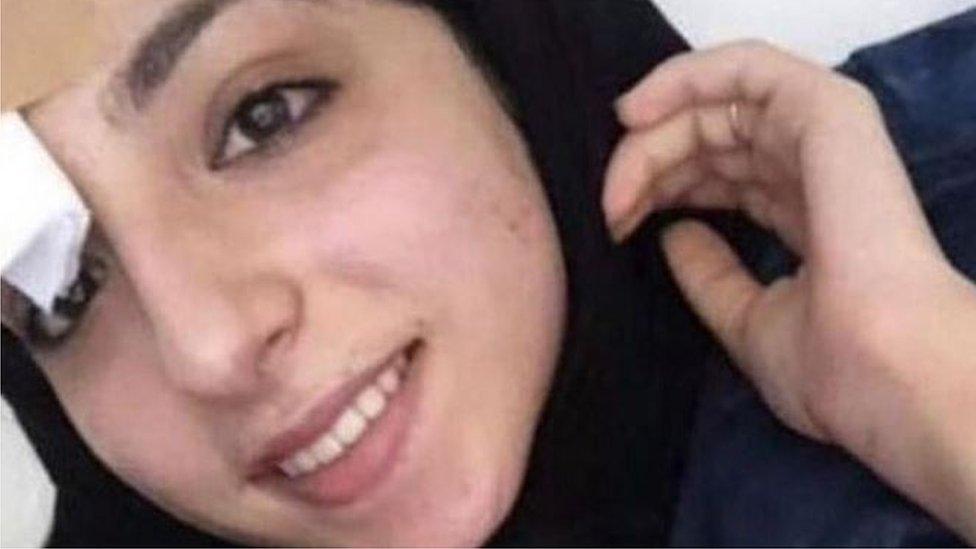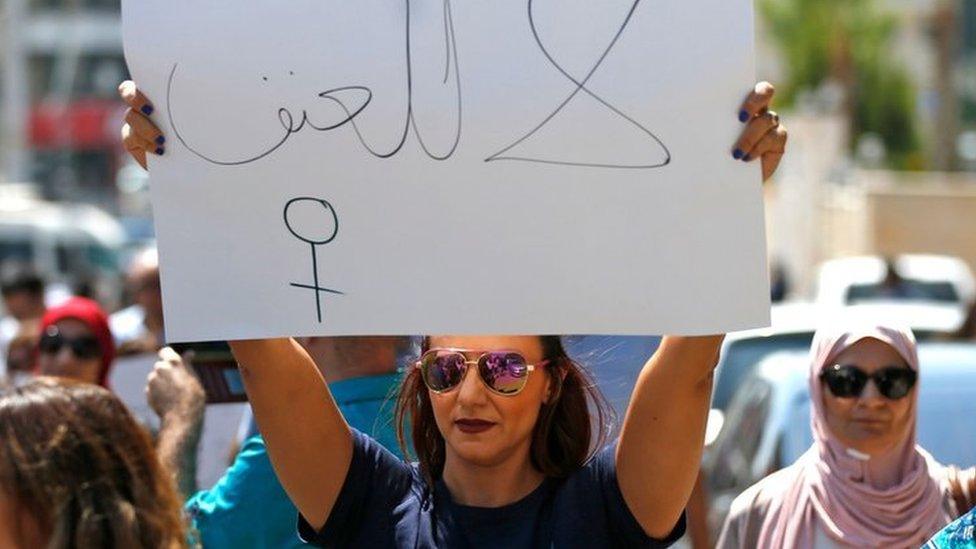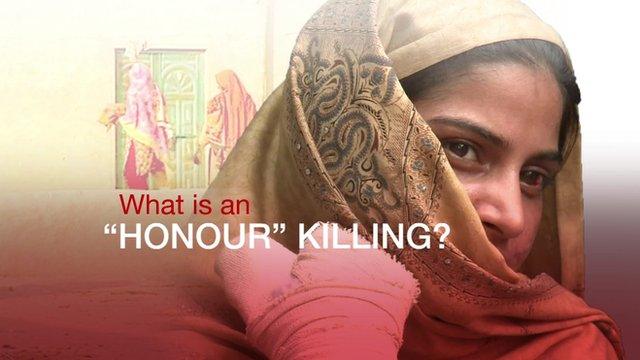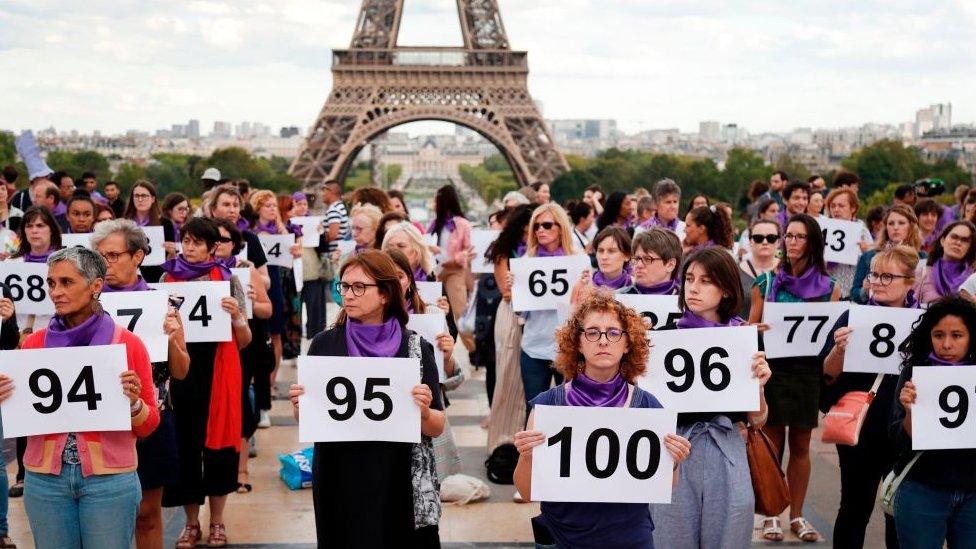Israa Ghrayeb: Palestinian woman's death prompts soul-searching
- Published

Israa Ghrayeb was a well-known make-up artist in the West Bank
When a young woman was admitted to Al Hussein hospital with a fractured spine and bruises on her body and face, doctors began to treat yet another case of traumatic injury.
Everyone here was used to young patients arriving with devastating wounds.
The hospital is located close to the Palestinian city of Bethlehem, whose streets lead past packed suburban refugee camps to Israeli army checkpoints and the foreboding separation barrier - all frequent flashpoints for violence.
But Israa Ghrayeb's story was different.
It would unravel into tragedy, protest and much soul-searching over the protection of women from gender-based violence in Palestinian society.
"It's going to be a very important turning point and we will always remember Israa Ghrayeb," says Randa Siniora, who runs the Palestinian Women's Center for Legal Aid and Counselling.
Less than a fortnight after her initial admission on 10 August, Israa was brought to hospital again but this time the doctors could do nothing. She was dead.

Protesters are demanding the enforcement of laws to protect women from domestic violence
The authorities, now under significant pressure over their handling of the case, have since said she had suffered fatal injuries after being beaten.
Palestinian Attorney-General Akram al-Khateeb held a news conference on Thursday in which he described Israa as a victim of domestic abuse.
He said that she was subjected to psychological pressure and physical violence, as well as what he called "conjuring and illusions" by members of her family.
Three of Israa's male relatives have been charged with assault leading to her death.
For campaigners, the case has revealed much about a lack of basic legal protections for Palestinian women.
"Israa was very independent and outgoing," one friend told the BBC, describing a vibrant and self-motivated woman.
"Her dream was to become famous in her line of work," he said.
The 21-year-old was an unmistakable face in her village of Beit Sahour, nestled beside Bethlehem in the steep hills of the West Bank.
She was a make-up artist whose striking images on Instagram attracted thousands of followers.
"I loved this black look I did on my stunning Mashallah," she wrote, using an Arabic phrase asking for God to bless the model she had made up in dark eyeshadow.
Israa came from a conservative family where strict social rules guide courtship between young women and men, and her use of social media would become a focal point amid the disputed circumstances that led up to her death.
She is believed to have posted to friends on social media a photo of herself and her fiancé in a coffee shop. The contents of the account have since been deleted.
According to local media coverage in the days after her death, family members regarded her being seen publicly with a man as dishonourable - even though they consented to the relationship.
Her injuries were explained as being self-inflicted. Her brother-in-law, Mohammed Safi, said she suffered from mental health problems and fell from a balcony at home - a claim prosecutors have since described as "invalid".
A smiling Israa posted pictures of her injuries online, apologising for having to postpone make-up appointments, adding: "My spine is broken and I have a surgery today. If the surgery goes well I will let you know and if not I will have to cancel everything."
Despite being seen by medical staff and taken for radiography tests, no further action appears to be have been taken by police at the time into what health officials admit were "signs of abuse".
'Possessed by bad spirits'
Israa's body was buried, according to Islamic tradition, in the hours following her death.
Her case may have ended there, had it not been for a Palestinian Facebook group called Do You Know Him?, external in which users "expose" men who mistreat women or cheat on their spouses.
The group posted a recording of what it alleged was Israa screaming while being beaten by her brothers, brother-in-law and father in hospital.
Prosecutors said last week the tape merged two clips recorded seven hours apart, while the hospital categorically denies she was beaten on its premises.
But the claims in the Facebook group began to spread, and concern about Israa's story snowballed.
The group also published WhatsApp conversations between Israa and her cousins in which she said she went out with a man who would soon be her fiancé, with the consent of her family.

You might also be interested in:

The hashtags "Israa Ghrayeb", "No honour in honour crimes" and "We are all Israa Ghrayeb" started trending on Twitter in several Arab countries.
"In this specific case, social media played a significant role in pushing the authorities to work harder to solve the case," says Tala Halawa from BBC Monitoring, which has been following the way the case played out online.
"Thousands of tweets and Facebook posts called for justice for Israa, and many women shared their fears and personal stories about similar events they witnessed themselves."
Protesters for women's rights began to gather outside the Ramallah office of the Palestinian Prime Minister Mohammad Shtayyeh.
They demanded the enforcement of laws to protect women from domestic violence, accusing officials of failing to protect Israa before her death and doing little to investigate afterwards.
"Immediately I thought that there was something wrong with Israa; I did not believe the story that she fell from the balcony," says Randa Siniora.
"[The family] were claiming that she had spirits, a genie, bad spirits," she says.
This was a reference to the media interviews given by Israa's brother-in-law - as the case gained publicity - in which he claimed that she had been possessed.
The unusual explanations for what had happened became another focal point for campaigners.
"The devil is in your head and not in women's bodies," read one demonstrator's placard.
Amid the storm of online anger and a wave of protests, further forensic tests from Israa's body were ordered.
A pathologist's report found that she had died from severe respiratory failure due to a collapsed lung, caused by multiple injuries she had sustained.
The attorney-general's news conference in Ramallah described her death as a result of "torture and abuse".
The explanation that she fell from the balcony was "fabricated" and "circulated to mislead the investigation", his statement said.
Contacted by the BBC, a close family member declined to comment.
The two hospitals first attended by Israa said they had informed the police and family protection groups during her admission. But the authorities have yet to state why more was not done before her death.
Increasing violence
Israa's story is far from unique.
The Palestinian Women's Center for Legal Aid and Counselling said it documented 24 cases last year in which women died after gender-based violence or abuse in the West Bank and Gaza Strip.
The human rights group Al-Haq has for several years drawn attention to what it calls an "alarming increase" in incidents of violence against women, including murder.
Campaigners blame a culture of impunity towards male perpetrators, bolstered by a penal code dating from the 1960s in the period that Jordan occupied the West Bank.
Some of its provisions create a loophole used by Palestinian courts to pardon or issue lenient sentences to men who commit violence against women when they plead they acted out of family honour.
Thousands of the so-called "honour" killings take place every year around the world
The Palestinian Authority (PA) in 2011 amended the law with the aim of deterring the so-called "honour killings" excuse.
But a 2017 report by the United Nations said judges in most cases still resorted to articles 99 and 100 of the code, "whose application mitigates the penalty of killing, including if the victim comes from the same family of the perpetrator".
It also said Palestinian women suffered "multiple sources of discrimination and violence" both in public and private.
"They suffer the violence of the Israeli occupation, whether directly or indirectly, but they also suffer from a system of violence emanating from the tradition and culture, with embedded patriarchal social norms," the report added.
There is a further problem in the way Palestinian law deals with families in which alleged violence takes place, according to Randa Siniora.
She says the code does not oblige family members who may be witnesses to give information to the police - rather it protects them from giving statements, which can further strengthen the power of men in the family.
Campaigners point out that the PA is a member of several international conventions obliging it to uphold human rights measures and prevent gender-based violence. The UN said in 2017 it was concerned about a "lack of implementation".
A campaign is now up and running demanding justice for Israa.
Suheir Faraq, one of its spokeswomen, suggests that change must be social as well as legal - claiming that Israa's alleged abuse was well-known about.
Women like her need to believe they will be helped, she suggests.
"There must be a mechanism for women not to be afraid to come forward."
- Published12 September 2019

- Published28 October 2014

- Published7 September 2019
